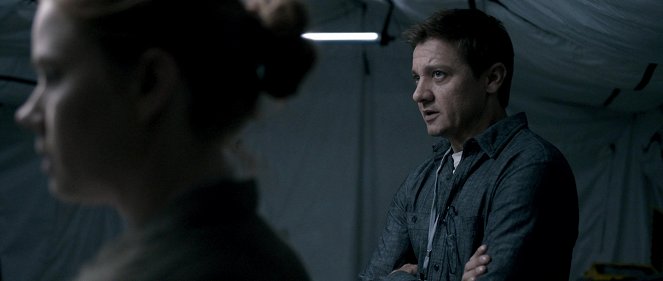Director:
Denis VilleneuveGuión:
Eric HeissererCámara:
Bradford YoungMúsica:
Jóhann JóhannssonReparto:
Amy Adams, Jeremy Renner, Forest Whitaker, Michael Stuhlbarg, Tzi Ma, Mark O'Brien, Joe Cobden, Russell Yuen, Nathaly Thibault, Pat Kiely, Julian Casey (más)Streaming (3)
Sinopsis(1)
Cuando misteriosas naves espaciales aterrizan en todo el mundo, un equipo de élite (Jeremy Renner y Forest Whitaker) liderado por la lingüista Louise Banks (Amy Adams) intentan descifrar el motivo de su visita. A medida que la humanidad se tambalea al borde de una guerra, Louise y su equipo luchan contra el tiempo llegando a poner en peligro su vida y, muy posiblemente, la del resto de la humanidad. (Sony Pictures Esp.)
(más)Videos (32)
Reseñas (18)
Lo siento, sobre todo porque soy admirador de Villeneuve, pero La llegada tropieza en mis ojos en la conexión narrativa de las dos historias. La línea del melodrama de Louise es fuerte y la película se basa en este melodrama en una idea filosófica más significativa y especialmente más tangible que cualquier otra película de ciencia ficción de los últimos años (incluida la igualmente íntima Gravity o el espectáculo pomposo de Nolan que no tiene cerebro). Esta historia no puede dejar un ojo seco. Pero su colaboración con la línea de comunicación suspenso-científica con los extraterrestres, que pretende estimular la curiosidad del espectador, se estanca en el último tercio. Y no solo por desvíos innecesarios y disruptivos como el ataque de un grupo de soldados rebeldes a la nave alienígena, sino en general por entrelazar planes narrativos, que se supone encajan a la perfección y sorprenden al espectador en el final con algún punto gracioso. Cuando la vi por primera vez, el punto gracioso no me parecía nada especial. Cuando la vi por segunda vez, paradójicamente, disfruté más de las visiones de Louisine, sabiendo lo que significaban por conocer ese punto final. Pero ni la primera ni la segunda vez que vi la película experimenté el éxtasis emocional-intelectual que describe la mayoría de mis colegas y que, de hecho, tanto desearía experimentar. Banda sonora y ambientación excelentes, Amy Adams fantástica.
()
I would never have believed that a sci-fi film could say more about the nature of people in general than the hundreds of other psychological films that have graced cinema screens. This a cinema event with capital E, I've been waiting for sci-fi like this since Zemeckis's excellent Contact in 1997. And at the same time it's a litmus test of our population, whether you're idiots (like the guys two rows behind me, who spent the whole movie making jokes and unknowingly poking fun at their own idiocy) or sensitive people who can appreciate something like this. And Amy Adams is awesome.
()
This is the best film in about the last five years. It’s terse, brisk, clever, and in many ways bold. The best thing about it is that the sci-fi storyline is much less important than the personal one. I hardly need to see it 3 more times to appreciate the unique picture-sound interplay and award the editor a couple of golden statuettes. After it was over, I stood in the flying snow, wanting to do a lot of things, but then I realized that the best thing to do was to just let myself drift through the incredible flurry of all kinds of feelings. I've truly been waiting for a movie like this for years.
()
If I were able to think like a heptapod (and if events are not predetermined), I would read Chiang’s short story after watching the film. With knowledge of the original story, the film doesn’t manage to be surprising with respect to what it aims for from the beginning and what it so much relies on to its own detriment. ___ Whereas Chiang gets straight to the point, Villeneuve understandably dedicates much more space to exposition. The first encounter is thus preceded by a comically long “build-up”, during which the protagonists fly in a helicopter to Montana, put on protective coveralls, drive to an enormous spaceship, climb onto a lifting platform, ride the lifting platform (because we would be deprived of one dramatic ride if the platform stood directly below the opening) and walk into the bowels of the ship. The only function of this procedural porn is to prepare us for an essential and epic reveal which, however, doesn’t happen, because all we learn from it is what the aliens look like. The individual steps leading up to the act of communication don’t play any more of a significant role later. For me, the entire film was such a similar unfulfilled promise as the scene described above. ___ The long and slow opening sequence is also unsatisfying in introducing protagonist, whose actions throughout the rest of the film can probably be explained by the fact that she lives alone and compensates for her poor personal life with work (she is the only one who goes to school even when the rest of the world is experiencing an alien visitation). Many of the informative dialogue scenes, flashbacks with the child and the scene in which Louise translates a conversation in Chinese so that we know she also speaks Mandarin, feel similarly utilitarian and inorganic. The coldly engineered approach to the characters, who remain mysteries like the alien logograms until the end of the film, wouldn’t matter so much if it wasn’t in conflict with the melodramatic level of the narrative, which is based on the relationships and motivations of the protagonists and becomes dominant in the end (I consider the replacement of an accident, which perhaps could have been prevented, with an incurable disease, which can only be accepted as an inevitability according to melodramatic conventions, to be quite essential). ___ In the short story, a theory that is partially revealed is continuously applied to a universally comprehensible story whose main purpose is to make the heptapods’ way of thinking comprehensible. The aim is thus not to move the reader, but to help them understand how “it” all works. Conversely, the newcomers attempt to offer emotional rather than intellectual satisfaction, but they’re not very successful. However, Arrival is still a skilfully made sci-fi movie about the importance of (mis)understanding, though it is too reminiscent of Interstellar due to its expository dialogue, extremely serious tone and cold visual style, but I wasn’t as impressed with it as I was with the short story. Among other things, that is due to how doggedly it tries to astonish the viewer. Postscript: If the solution presented by the film for reuniting a divided world is the only one possible, then we’re pretty much fucked. 70%
()
(menos)
(más)
A monumental, reflective, humanistic, moving sci-fi film. Exactly what Interstellar desperately wanted to be, but failed to achieve. Arrival is not without its minor issues, about which I may write later (IMHO, the way the script addresses the communication between the different world teams during the research is a little confusing), but the goosebumps at the end overcome all that.
()



Anuncio